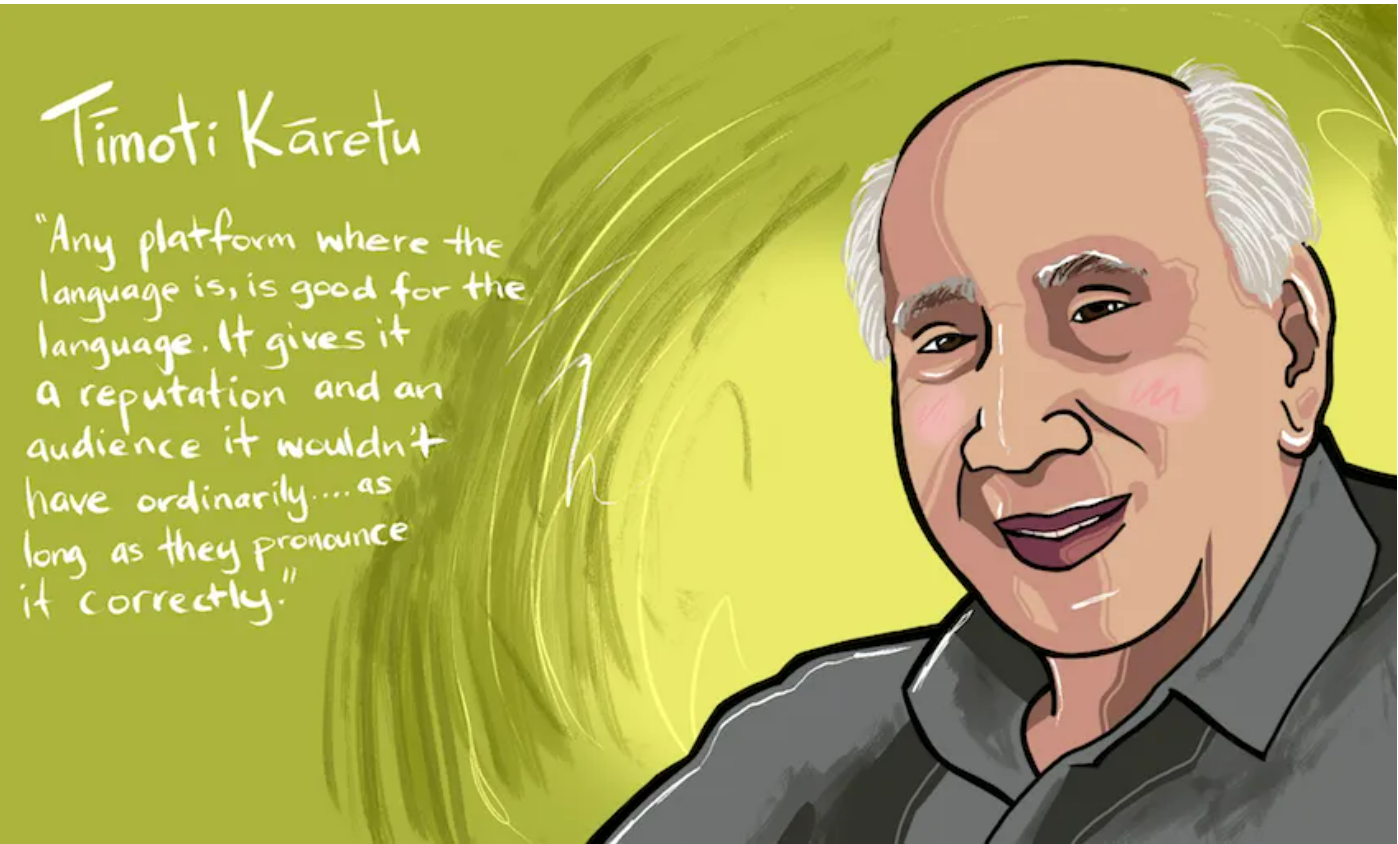-
Ngā Karere me Ngā Rauemi
News and Resources
Ngā Karere me Ngā Rauemi
News and Resources
-
Te Rangaihi Reo Māori
The Movement
Te Rangaihi Reo Māori
The Movement
-
Te Pae Kōrero
Our Community
Te Pae Kōrero
Our Community
-
Huihuinga
Events
Huihuinga
Events
-
Ngā Ara Ako
Learning Pathways
Ngā Ara Ako
Learning Pathways
-
SearchSearch
Search
Search

Translation in music is an art form that deals in intent, rather than facsimile, Tīmoti Kāretu says: “Once you’ve done a translation you need to talk to the composer to make sure you’ve conveyed what he or she wants. Sometimes I’ve said, well, if that’s what you intended, then why the hell didn’t you say that? But that’s how artists are. They’re creative and I suppose that’s what makes them interesting to us. They’re not ordinary people.”
Despite the fragility with which some treat the language, Kāretu has no reservations about te reo Māori finding its way to a large global audience through Te Ao Mārama. “Any platform where the language is, is good for the language. It gives it a reputation and an audience it wouldn’t have ordinarily… as long as they pronounce it correctly. Ella’s pronunciation was really quite good. As long as composers listen to you, then you’re fine.”
Kāretu says he recognises the trauma and shame that is experienced by Māori who can’t speak their language, and how the use of it by non-Māori may affect them. He’s seen it first-hand, describing a “salient difference” in working with Māori artists that can’t speak the language, and enthusiastic Pākehā learners, like Yelich-O’Connor.
“I have been really quite concerned about [those Māori artists] whose desire comes from a different angle. That reaches you much more strongly. That’s not to say Ella’s desire is shallow, but hers doesn’t come from the same hurt.” True to his fierce reputation, however, he says he’s not prepared to dance around anyone’s feelings. “Tough it out!” he says with a chuckle.
“No, you feel the difference and you work with the difference. But we don’t have to stay at a point of ignorance for the rest of our lives. We can do something about it if we want to, and I admire all those that do.” Befitting of his status, Yelich-O’Connor travelled to his hometown of Waimārama in Hawke’s Bay earlier in the year to spend time with him. He describes her as a “very likeable lady”. In return, Yelich-O’Connor describes him as “funny and witty and kind of brutal”.
She admits she was unsure of the reception she’d receive: “He looms so large over the language movement, and he’s such an icon. I wasn’t sure what he would be like. But it was important to meet him, and for him to meet me and sort of sniff me out, because he does that; he sniffs you out. He’s like, ‘So, what are you doing this for?’”
The pair bonded over his “favourite city in the world” and her home-away-from-home, New York: “He’s so well-travelled – knows New York intimately, has seen every Broadway show. He’s a man of so many cultures.” Many of Kāretu’s New York trips have been while taking Te Panekiretanga classes to visit with Indigenous groups in North America and Hawai’i, where he spent a sabbatical year at the university there. He’s all too aware of the acute language loss suffered by all Indigenous cultures. “We would go over to exchange ideas, and to see, in our case, where we’re at in terms of the language. The rule was always no English spoken unless you have to speak to someone who doesn’t understand, and the Native Americans were always really interested to hear that. We would encourage them, and they would encourage us. To keep on fighting.”
He’s hoping that this release could inspire musicians in other countries to showcase their own Indigenous languages. “It might give an idea to a singer in the United States or Canada to try and use one of the local languages in their singing, and work with those Indigenous peoples. It’s a positive all round.” For all the struggle he’s seen, Kāretu remains hopeful that the revitalisation efforts of his peers and those who’ve come after are paying off.
“This generation, of 20- to 40-year-olds, are much more fluent than their grandparents. The parents of this generation do not speak Māori as a consequence of what their parents went through, but were forward thinking enough to put their children into schools where it was taught. I doff my hat to that generation of parents,” he says. “But the young ones coming up, they want to get it right. They very much have my support and my admiration.”
Tā Tīmoti Kāretu
Illustration by Miriama Grace-Smith
Tāmaki Makaurau | Auckland | Auckland | 2020-29 | Lorde releases te reo mini album | Story is by tangata whenua
















Comments